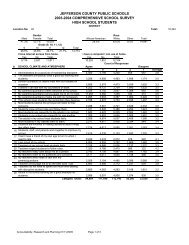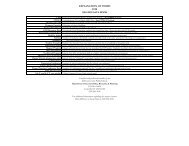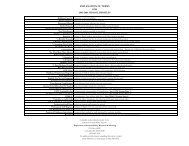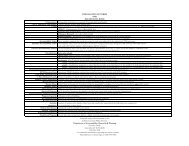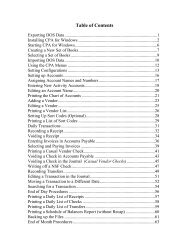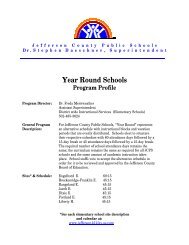Yellow Jacket Times - Jefferson County Public Schools
Yellow Jacket Times - Jefferson County Public Schools
Yellow Jacket Times - Jefferson County Public Schools
Create successful ePaper yourself
Turn your PDF publications into a flip-book with our unique Google optimized e-Paper software.
De’Ericka Jernigan<br />
Do you or a friend of yours suffer from an Obsessive Compulsive Disorder but are simply not aware of<br />
how to address it? Well I am here to tell you everything there is to know about OCD and how you can treat<br />
this disorder. Your first step is to realize and admit that you have a problem to a professional; your next step is<br />
to get a clear understanding of what OCD truly is.<br />
An Obsessive Compulsive Disorder is an anxiety disorder in which people have unwanted and repeated<br />
thoughts, feelings, ideas, sensations (obsessions), or behaviors that make them feel driven to do something<br />
(compulsions). Often the person carries out the behaviors to get rid of the obsessive thoughts, but this only<br />
provides temporary relief. Not performing the obsessive rituals can cause great anxiety. I personally often find<br />
myself re-checking locked doors or flushed toilets just to make sure of myself that everything is secure. When I<br />
go back to make sure the door is locked or the toilet is flushed, I feel completed in some way and then I would<br />
go on about my day. Although I do not re-check things multiple times, that does not mean that I do not have a<br />
problem.<br />
There are many signs and symptoms that will help you identify whether or not you have this disorder.<br />
Most people who develop OCD show signs by the age of 30, but recent tests show that you can show signs of<br />
this disorder before the age of 30. Other signs include obsessions or compulsions that are not due to medical<br />
illness or drug use, and obsessions or compulsions that cause major distress or interfere with everyday life.<br />
The main types of obsessions and compulsions are checking and rechecking actions (such as turning out the<br />
lights and locking the door), excessive counting, excessive fear of germs, the compulsion to repeatedly wash<br />
the hands to ward off infection, and the person usually recognizes that the behavior is excessive or<br />
unreasonable.<br />
Some reports have linked the cause of OCD to head injury and infections. Several studies have shown that<br />
there are brain abnormalities in patients with OCD. This disorder can be treated using medications and<br />
therapy. The first medication usually considered is a type of antidepressant called a selective serotonin<br />
reuptake inhibitor (SSRI). These drugs include: Celexa, Prozac, Luvox, Paxil, and Zoloft. Although you have<br />
medicine to treat this disorder, OCD is a long-term (chronic) illness with periods of severe symptoms followed<br />
by times of improvement. However, a completely symptom-free period is unusual, but most people improve<br />
with treatment. With that being said, if you are a victim of OCD seek help immediately and follow through<br />
with treatment so that re-checking locked doors and already flushed toilets do not become a part of your life<br />
as a daily routine.<br />
References:<br />
http://en.wikipedia.org/wiki/Obsessive%E2%80%93compulsive_personality_disorder<br />
http://psychcentral.com/disorders/sx26.htm<br />
http://outofthefog.net/Disorders/OCPD.html





